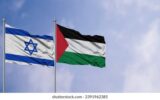RASHEEN BAPPU
COLOMBO The United Nations in Colombo, screened the documentary of the life of Palestinian activist and one of the directors Basel Adra, who hails from Masafer Yatta in the Israeli occupied West Bank.
Through the turbulent life of Adra, who starts filming to document the destruction of his hometown by the Israeli regime, No Other Land unveils the less talked about and often covered up systematic oppressions Palestinians in the West Bank are subjected to at the hands of the military and Israeli settlers alike.
The film also captures the intricacies and complexities of a rare friendship between the Palestinian filmmaker and Israeli journalist Yuval Abraham who joins the project and helps to amplify Adra’s voice.
The film produced between 2019 and 2023 is heavily reliant on camcorder footage captured by Adra, which includes visuals of Israeli soldiers bulldozing Palestinian homes, the village school and filling water wells with cement to prevent people from rebuilding.
The film also shows Israeli soldiers shooting a local man protesting the demolition of his home. The man becomes paralyzed, and his mother struggles to take care of him while living in a cave.
“About two months ago, I became a father, and my hope to my daughter that she will not have to live the same life I’m living now, always fearing settlers, violence, home demolitions and forcible displacements that my community is living and tasting every day under Israeli occupation,” Adra said after receiving the award.
He also called on the world to “take serious actions to stop the injustice and to stop the ethnic cleansing of the Palestinian people.”
Addressing a largely American audience, Abraham criticized the US foreign policy which “blocks the path” towards a political solution for Israelis and Palestinians without ethnic supremacy.
With Adra beside him, Abraham asked, “Can’t you see that we’re intertwined – that my people can be truly safe if Basel’s people are truly free and safe?”
Beyond the rare collaboration of artists, what makes No Other Land’s win at the Oscars historic is that it has made Palestinian content unignorable on the global stage, most importantly on the American stage.
“I’m in tears to see the Palestinian art finally being recognized in such a way. This is well-deserved not only because of the brilliance of artists who made this documentary but because our story is just and deserves all the support and recognition there is in this world,” Palestinian poet and activist Mosab Abu Toha wrote on X.
Despite being nominated to the Oscars and winning several accolades earlier, including the audience award and documentary film award at the Berlin International Film Festival in February 2024, as well as the New York Film Critics Circle award for Best Non-Fiction Film, No Other Land could not find a distributor in the US.
“It’s important for people to watch it so they can understand what’s going on… Especially in the US which, as a country, is a main player in what’s going on. Americans have a responsibility, I believe, and I hope that they watch it and move in the right direction and take any action they can in order to help us change,” Adra had remarked while speaking to IndieWire regarding the film’s challenge to find a distributor.
“I think the conversation in the United States appears to be far less nuanced — there is much less space for this kind of criticism, even when it comes in the form of a film,” said Abraham.
However, No Other Land’s trouble to find a distributor is only a trivial extension of the suppression, censorship and sometimes erasure of Palestinian art that have happened with impunity over the years.
In last October, nearly 19 Palestine-related movies were removed from its collection by American streaming giant Netflix.
Challenging the streaming platform’s hesitancy to provide a public explanation for the removal, California-based NGO ‘Freedom Forward’, in a letter to Netflix CEO Reed Hastings wrote, “The systemic suppression of Palestinian voices and censorship of content prevent US and Western societies from being aware of and understanding the reality of Western governments’ support for Israel’s brutal policies of occupation, apartheid, ethnic cleansing, and now, genocide of Palestinians.”
Speaking of the erasure and censorship of Palestinian stories and culture, Palestinian-American academic Edward Said, in his essay titled’Permision to narrate’ , emphasized that Palestinians are being systematically denied the agency to tell their own stories.
He stated that the West’s biased coverage and suppression of Palestinian narratives distort the region’s history and justifies Israeli aggression, which is why, for a more truthful understanding of history, Palestinians needed the right “to narrate.”
Given the context of a history of suppression of Palestinain content, some Palestinians think what made No Other Land’s victory possible is the Israeli association.
“No Other Land winning an Oscar is being framed as a historic moment for Palestinians, but would the Academy have awarded it if it weren’t framed as a joint project? Why did the speech stop at “ethnic cleansing” instead of genocide? Feels like more industry-approved normalization,” Palestinain activist Nerdeen Kiswani wrote on ‘X’.
On 3 April 2025, the UN General Assembly Committee on the Exercise of the Inalienable Rights of the Palestinian People held an exclusive screening of the 2025 Academy Award winner for best documentary “No Other Land” at UN Headquarters in New York. The film, co-produced by Israeli and Palestinian filmmakers, tells the story of the destruction of Palestinian villages in the occupied West Bank and documents the efforts to resist.
The documentary was created by the Palestinian director Basel Adra, Israeli journalist and director Yuval Abraham, Palestinian filmmaker and farmer Hamdan Ballal and Israeli cinematographer and editor Rachel Szor. Captivating critics, juries, and audiences across continents, the film has garnered dozens of awards and widespread acclaim. It was showcased at many film festivals, ultimately earning the Oscar for best documentary just a few weeks ago.
Earlier the same day, during the UN Committee’s 422nd meeting, film’s co-director Basel Adra, said he grew up seeing bulldozers entering Palestinian communities and destroying homes. But this was so routine that journalists were not interested in covering it. So, as a teenager, he started carrying a camera and filming because he wanted the world to see what it was like to live under brutal occupation.
Five years ago, he started working on the documentary with friends, he said, adding that the movie succeeded beyond expectations. “But even after winning the Oscar, we went back to the same reality,” he observed. He detailed many harrowing stories of violence, destruction and arbitrary detention. Three weeks after the Oscars, settlers attacked a mosque in the village of one of his co-directors, Hamdan Ballal. About 20 settlers started vandalizing the village. Hamdan tried to protect his family by locking the door of his house and standing outside, but two soldiers started beating him, and then abducted him and two other Palestinians to a military base. He spent 20 hours in the base, handcuffed and blindfolded while soldiers mistreated him — when he was brought to interrogation, he was accused of attacking the settler and only after he paid a fine was, he able to leave and get medical treatment.
Acknowledging No Other Land’s victory as a big win, artist collective ‘Art of Resistance’ claimed there is no way for a Palestinian to tell their own story to the world without the “buffer” of an Israeli & receive this level of accolades.
“If a Palestinian made the documentary “No Other Land” without an Israeli co-director, it would have never won an Oscar, & probably would have been banned and labelled as linked to “terrorism”.
( The writer is Prof Rasheen Bappu, International Security Analyst, Anthropologist, Practitioner PVET & Member of the International blast research network (IBRN).













